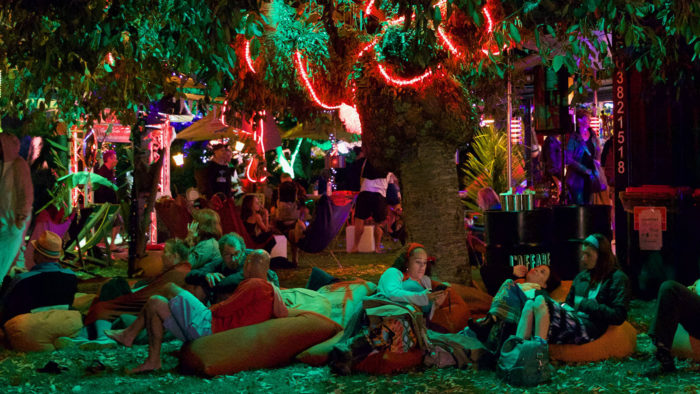WOMAD, Brooklands Park, New Plymouth, 13 to 15 March 2020: Concert Review
WOMAD. It was the last big event until who knows when? Rev Orange Peel reminisces for us.
I had a premonition that this would be the last big musical gathering for the foreseeable future. So early on Sunday morning, I headed off down-country from the outskirts of Auckland.
The temperature dropped to 8 degrees at its lowest. There was fog and mist, and as the sun came up, you felt you were driving through a mystical land bathed in clouds.
Passing through the spectacular scenery of Mt Messenger, and then siting Mt Taranaki, I am reminded again why overseas artists are so enthusiastic about the physical beauty of New Zealand.
A large gathering at Brooklands Park. It is now hot, up to 28 degrees and most shaded areas filled. Very family orientated crowd, the amount of clothing worn directly proportional to age.
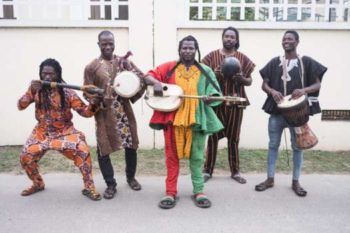 King Ayisoba and his band are from Ghana. The King is Albert Apoozore, born 1974 in the Upper East Region of Ghana. He grew up tending sheep and cattle on the family farm. He was a child prodigy playing the kalogo, a two-stringed lute instrument with a calash gourd resonator and animal hide covering.
King Ayisoba and his band are from Ghana. The King is Albert Apoozore, born 1974 in the Upper East Region of Ghana. He grew up tending sheep and cattle on the family farm. He was a child prodigy playing the kalogo, a two-stringed lute instrument with a calash gourd resonator and animal hide covering.
There are variations on this instrument all over West Africa. Kalogo music is all polyrhythmic tribal drum music. Remember King Sunny Ade with the talking drums overlaid with melodic electric guitar and keyboard fills. This is more minimalist, the kalogo sounds like a bongo drum played in this fashion.
The King leaps onto the stage with a solo piece, immediately you feel this is the sound you would hear everywhere continually in Ghana. Legend has it that a very bad thing will happen if the drums are ever silenced.
He is the joined on-stage by the rest of the band, and…more drums. Guluku, dundun, djembe and benme drums.
The band proceed to deliver a fast-paced set with energetic dancing. Music like this, with complex rhythmic overlaid textures is very visceral and quickly the crowd are up and dancing or swaying.
Talking Heads Remain in Light, particularly the first side, would give you some reference point to the style and feel of this music.
In my slightly fevered, hot sun beating down, dehydrated mind I possibly hallucinated the King saying to us, “If the drums ever stop a very bad thing will happen. Very bad. Because then….the Bass guitar solo starts!”
Straight after, we make our way up the steep path from the Dell stage, to the Gables stage.
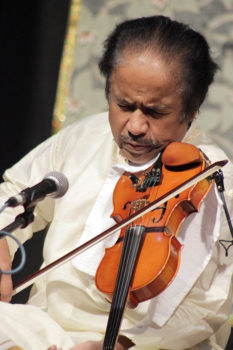 There, L Subramianiam is setting up. Thankfully he is having some sound issues and that gives us time to stagger there.
There, L Subramianiam is setting up. Thankfully he is having some sound issues and that gives us time to stagger there.
Lakshminarayana is his Christian name. Born into a large extended musical family in 1947, he was trained in the classic Carnatic musical tradition. He gave a first public performance at age six. He gained a medical degree and did work as a GP for a short time before giving that away to devote to music full-time. He also has a PhD in music.
He has played with Yehudi Menuhin, Stephane Grappelli, Herbie Hancock, Stanley Clarke, Jean-Luc Ponty, George Harrison and Stevie Wonder to name just a few.
He has been involved in film music. He has married musicians and also has highly talented musical children. In short, he is a music colossus and I was much anticipating this.
On stage he had with him a tabla player, a larger single hand-drum player, and the third playing what looked like a large skin-covered ball.
Soon as the music starts, and instantly all the heat, sweat and dehydration melts away and you are transported to the music god realm. There is no better place to be at 4pm in the afternoon on the planet.
If the music is recognisable as Indian, it immediately also pulls in western music, until the intertwining really loses any boundaries.
Subramaniam has given us a brief explanation of what his music is all about, from its classical Indian origin, but most important to me was that it would be 95 per cent improvised.
Most of the audience near the stage with me are captivated. Somewhere after forty minutes, I look to the right and see some nymphs, naiads and fairies having appeared, dancing to the enchantment, from A Midsummer Nights Dream.
This really was worth whatever effort to took to get here.
And at this time of mounting disharmony and hysteria, it is profoundly reassuring to experience the exact opposite.
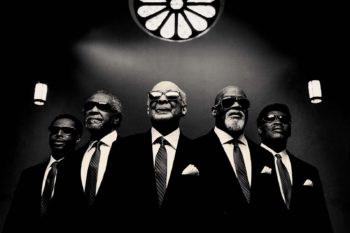 Straight over to the Todd energy stage to see the legendary Blind Boys of Alabama.
Straight over to the Todd energy stage to see the legendary Blind Boys of Alabama.
Somebody I know who shall not be further identified had waved to them earlier in the day as they were passing by.
The four singers are seated on stage. Around them are the younger members, playing lead and bass guitar, drums and keyboard. All are wearing red jackets. The sun is still hot and a few small fans are on-stage.
Jimmy Carter is up and talking. I first saw this band at the old Downtown in Auckland in the early 80’s. Jimmy was there, along with founding members Clarence Fountain and George Scott.
I was addicted to gospel music by then, especially the Soul Stirrers. Hearing the Blind Boys live was a revelation, the purest essence of rock’n’roll.
They had their origins in 1939, and like the Stirrers, they were pioneers of the hard gospel style, involving shrieks, screams and a dramatic presentation, bringing the listening congregation to near-orgasmic intensity. Thank you Jesus, thank you Lord!
They have visited New Zealand several times since and I think I have seen each show. Of special note is when jimmy goes into the audience to sing.
I last saw them at the Spark Arena. They opened for Robert Plant and the Shapeshifters. They couldn’t go into the audience then and they can’t this afternoon.
Jimmy, who is 88 now, gives us a brief background of the group, and then they’re off as all four singers stand and give us a powerful rendition of a song from their 1944 professional debut, I’m Gonna Be Ready. This is followed by Curtis Mayfield’s People Get Ready. The singing may not be as intense after that as the heat takes its toll.
Way Down in the Hole is the theme song from The Wire, possibly the greatest TV drama series ever made. Originally sung by Tom Waits, the producers felt his style wasn’t quite what they wanted, hence the Blind Boys classic rendition.
In the last 30 years they have become music royalty and have recorded with everyone, also receiving Grammys’ and Hall of Fame recognition.
Popular recordings include ones with Ben Harper, and this afternoon they perform There Will Be a Light from the same album.
The younger members supply a tight and precise rhythm and blues backing throughout. The elders wind up the vocal intensity as the set closes.
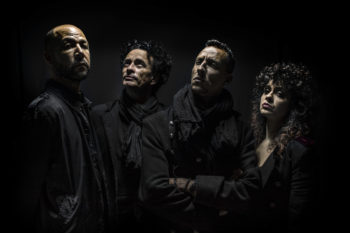 Much later in the evening, we are back at Todd stage for the closing set of the weekend, from Ifriqiyya Electrique. It is much colder now, feels like eleven degrees. I have forgotten warm clothes so am wearing an extremely grungy looking raincoat. It fits the mood.
Much later in the evening, we are back at Todd stage for the closing set of the weekend, from Ifriqiyya Electrique. It is much colder now, feels like eleven degrees. I have forgotten warm clothes so am wearing an extremely grungy looking raincoat. It fits the mood.
They took the audience by surprise with their first set on the TSB Bowl stage on Saturday afternoon, and I am told they are a must-see.
The music’s origin is from the Banga ceremonies of the deserts of Tunisia. Chant and trance music, rhythmic drones and metal castanets called krakrebs. Music of possession and rituals.
This has been turned into North African Desert Metal with electric guitar, bass, electronic backing beats and throat-shedding vocals.
On-stage we have guitarist Francois Cambuzet putting out sheets of sounds reminiscent of Bryan Gregory of the Cramps first album, Songs the Lord Taught Us. Periodically you hear riffs through the squall.
On the opposite side is bass guitarist Gianna Greco supplying a relentless bottom.
Between them, two guys playing the krakrebs and intermittent vocals whilst leaping about.
African music as we have heard all day is generally trance-driven, hypnotic, poly-rhythmic and also melodic. Ifriqiyya have become more menacing, louder, electrified and ultimately exhilarating. Maybe go back to The Stooges Fun House for an entry point.
The audience are enthusiastic, and whilst your WOMAD crowd do not head-bang or mosh in the traditional sense, you get this hippie-dervish hybrid dance.
I’ll paraphrase Francois. “Everyone thinks of North Africa as desert, camels, Bedouins, nomads, big tents, Moroccan tea. Well, that’s all bullshit. Life is hard and difficult, and young people express this with anger and fury. Birthday Party and Germs, they sound like choir boys next to them.”
He also mentions that they have just had 30 gigs wiped out, maybe they can hide out here for a while.
Incredible end to a super day of music.
~Rev Orange Peel
- No Broadcast – The Common Thread (Album Review) - May 14, 2023
- Rita Mae – Whammy Bar, May 5, 2023 (Concert Review) - May 6, 2023
- Dictaphone Blues – Greetings from Glen Eden (EP Review) ⭐⭐⭐ - May 4, 2023

